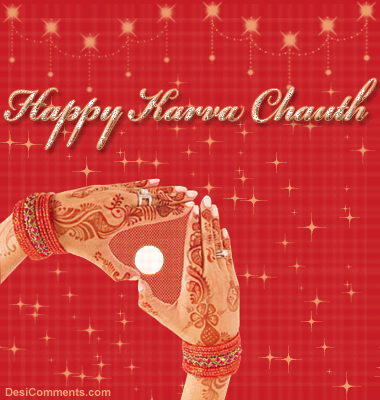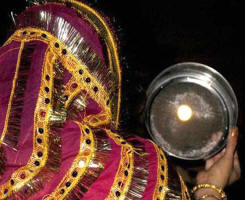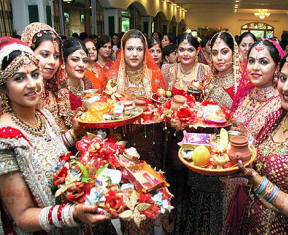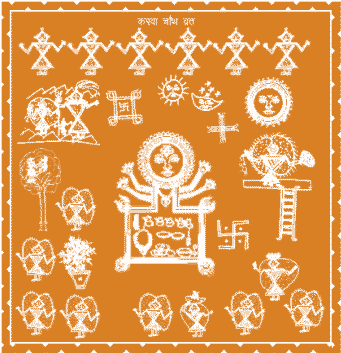
'Karwa Chauth' is a ritual, an annual festival in which married women fast for a day i.e. do not eat any kind of food and some cases do not even drink anything whole day till they see the moon and offer prayers. It is observed by married women in the northern and western parts of India for long life, well-being and prosperity of their husband.
The name of the festival is made of two basic elements - "Karwa" means "clay pot" and "Chauth" means "fourth day" . The clay pot is used in most of the Hindu rituals to offer water to the God, in this case to the moon. The festival is observed on fourth day of full moon in the month of late October or early November (Kartik month in Hindu calendar).

Preparation starts few days before festival. Women buy traditional cloths and various essential, items for rituals like Karwa (Clay pot), Bangles, Sweets, decorated plates etc. Henna (Mehndi) plays an important role in this festival. Women apply henna on previous evening. The red/maroon color of henna signifies the bond between husband and wife.
On the day of festival women wake up early before dawn, take bath and do basic prayers to the god. In some part of country women eat selective food (Sargi) and drink tea before sun rises. Shiva, Parvati and their son Ganesh, Kartikeya are worshiped on this day along with the 10 'karwas' (earthen pots) filled with sweets. The Karwas are given to daughters and sisters along with gifts.
For the remainder of the day, women do not eat anything. It is the most important and difficult fast observed by married Hindu women. (Unmarried women, widows, and spinsters are barred from observing this festival.)
Karwa Chauth Pooja Steps
As the evening approaches, women gather together in circle singing traditional songs and a version of Karva Chauth story is narrated with regular pauses by an older woman. The Karva Chauth Katha is usually associated with various celebrated tales of female characters who sacrificed herself to save her husband's life. In spite of being one of the toughest fasts, karva chauth is respected and strictly followed festival of the year. It is welcomed by married woman with great fervor. Because of its immense cultural and social significance, and emotional attachment between the spouses, Karva Chauth festival has become well known extensively.
In the contemporary times, Karva Chauth is interpreted as a romantic festival that symbolizes the love and affection between wife and husband. The essence of this festival has also been portrayed with excellence in the Indian movies.
Importance of Karwa Chauth
For a newly-wed woman, Karva Chauth is particularly special, as they get decked up in their bridal lehnga-choli. The things that symbolize and reflect the marital status of a woman, such as jewelry, bangles, henna, bindi, lehnga choli and many other traditional gifts are in high demand on this special occasion. Usually, women receive beautiful gifts from their husbands and relatives on this day, as a gesture of their love and care.
According to the ancient Hindu texts, the will power of a married lady to change her husband's bad fortune into good is so strong that it can even change God's ultimate decision. So, the relationship of man and his lady are eternal and blessed.
Special foods of Karwa Chauth - Sargi

Brides get beautifully wrapped baskets with the sargi (the food to be eaten before sunrise) from their mother-in-law. Sargi mainly consists of thirst-quenching foods, like fruits, along with a main course of potatoes eaten with hot Puris (a deep-fried Indian bread). Traditionally, a newly wed woman spends the day before the fast in her mother's house and comes to her mother-in-law's house only on the day of karwa chauth.
Traditionally, it is the mother who usually sends Bayna, which includes sweets, money, clothes and a karva (small earthen pitcher), to their married daughters' houses. In the evening, the mother-in-law or any elderly women of the house accepts the bayna, given to them by the younger married women of the family.

The women of the neighborhood usually gather in someone's house and perform the puja together, in the evening. A small area is prepared for the ceremony, which can be performed in any part of the house as well as in the open. A small square platform is placed against the wall and kharia matti (powdery mud) is used to cleanse and to decorate the puja area.
An idol of Gaur Mata, or Goddess Parvati (the consort of Lord Shiva), is placed on the consecrated spot. Traditionally, the tiny image of Gaur Mata was made from cow dung, though nowadays pictures or idols of Parvati are the norm.
Story of Karwa Chauth

A beautiful queen called Veervati was the only sister of seven loving brothers.
She spent her first Karva Chauth as a married woman at her parents' house. She
began a strict fast after sunrise but, by evening, was desperately waiting for
the moonrise as she suffered severe thirst and hunger. Her seven brothers
couldn't bear to see their sister in such distress and created a mirror in a
pipal tree that made it look as though the moon had risen. The sister mistook it
for the moon and broke her fast. The moment she ate, word arrived that her
husband, the king, was dead. Heartbroken, she wept through the night until her
shakti compelled a Goddess to appear and ask why she cried. When the queen
explained her distress, the Goddess revealed how the queen had been tricked by
her brothers and instructed her to repeat the Karva Chauth fast with complete
devotion. When Veervati repeated the fast, Yama was forced to restore her
husband to life.
The puja ends with the women showering rice and vermilion on Parvati and seeking
her blessings. The younger women touch the feet of the elders, seek their
blessings and offer their 'Baya' to them.
Breaking The Karwa Chauth Fast
In the evening, the women see the moon, while carrying a plate decorated with
lit earthen lamps and a container of water. The moon is seen through a fine mesh
or sieve. Water is offered to the moon, followed by some food. Though the
women are allowed to break their fast after they see the moon, it is preferred
if they can also see the faces of their husbands before they eat or drink. So,
the married men scurry back home from work as soon as possible, on this day.
Thereafter, the family sits down for a grand meal and the celebration comes to
end.
Steps to make Karwa Chauth fast easy
In the morning while you have sargi or any foos, try and avoid very sugary
and oily foods. The
sweet foods tend to aggravate hunger later in the day, therefore, avoid those
hunger pangs by avoiding too much sweet. Oily food will aggravate the thirst. Home made
Paneer is a healthy option as
it is high in protein and will therefore fill you up for longer.Consuming nuts such as almonds and walnuts as they make up your
energy reserves for the day. These nutritious nuts are high in essential fats
(linked to anti-ageing and lowering cholesterol) and are also high in protein,
which will keep you satiated for longer.

Henna mehndi is part of celebration
Drink 2-3 glasses of lukewarm water. If the water is warm, it
gets absorbed faster as it matches ambient body temperature. This is important
so fuel up your reserves at the time of your sargi.
Keep yourself occupied: The way to not think about food is to keep yourself occupied
throughout the day. Keep yourself busy with friends and family, low energy work
or household chores to keep your attention diverted from the fact that you are
not eating. A great way to spend some time with friends and relax completely, is
to go to a spa together.
Tea or no Tea: It's a personal choice to consume something liquid in the evening.
For those of you who would like to do this, make sure that if you're having tea,
to drink it with ample milk. Otherwise having tea on an empty stomach will
increase the acidity of the stomach and may cause pain (tannic acid in tea can
up the acidity factor). You could also consume lemonade with sugar and salt.
Before you eat in the night: When you open your fast at night, make sure to not consume
oily or spicy foods. This is because, the stomach's acidity is high at this time
anyway due to lack of food or water all day. Instead, consume light food, high
in good quality carbohydrates and protein to replenish the body's lost energy
stores. Also make sure to consume 3-4 glasses of liquids until you sleep to take
care of any dehydration that has occurred in the course of the day. A glass of
lemonade may also aid digestion at this time.
Henna Arts wishes you Happy & Safe Karwa Chauth